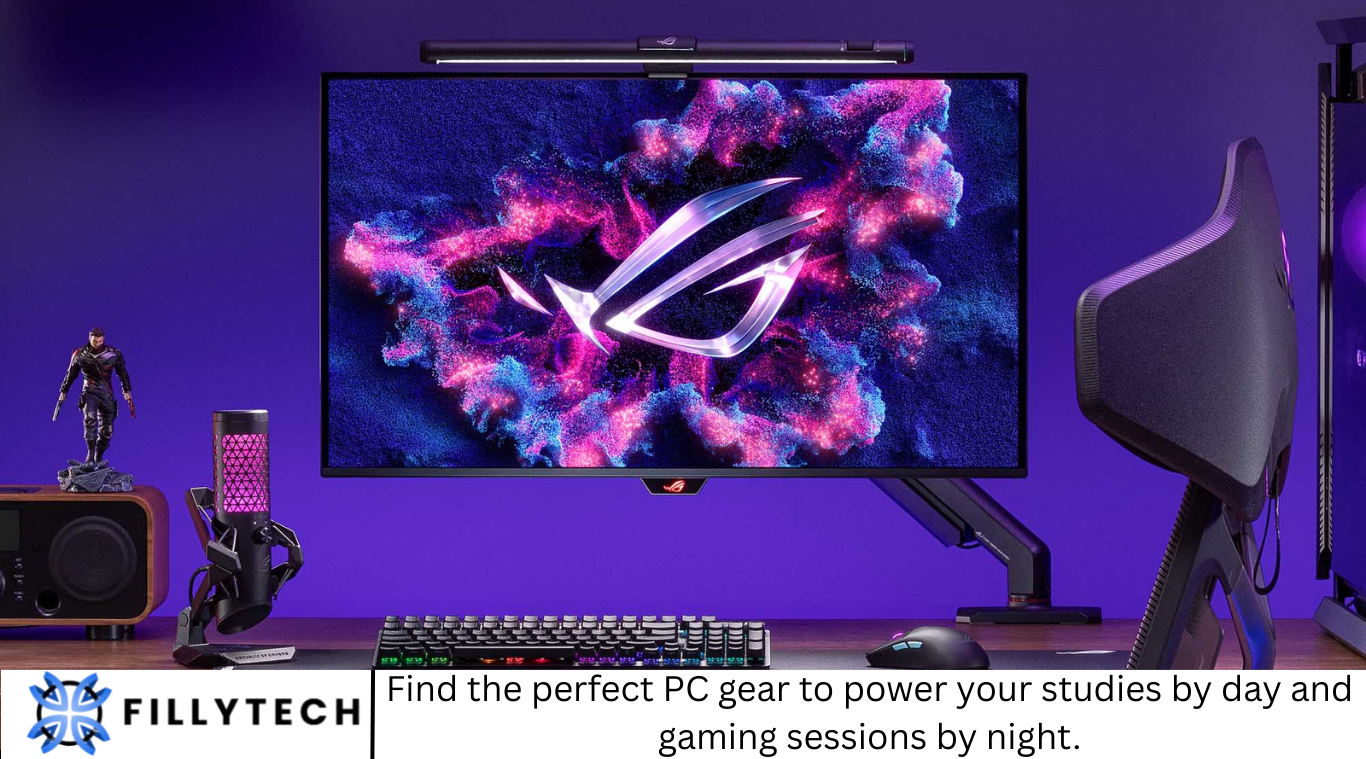Balancing productivity and entertainment can be challenging, especially for students and professionals who need a versatile PC setup. Whether you’re attending online lectures, completing assignments, or diving into immersive gaming sessions after hours, having the right PC gear is essential.
This guide will help you navigate the components, peripherals, and accessories you need to build or buy a PC setup that excels both as a study tool and a gaming powerhouse. We’ll cover everything from hardware recommendations, ergonomic setups, software essentials, and budgeting tips, helping you maximize your investment.
Understanding Your Needs: Study vs. Gaming Requirements
Study Needs
- Multitasking: Running multiple applications such as web browsers, document editors, video conferencing tools.
- Reliability: Stability and minimal downtime for productivity.
- Portability (if needed): For students who commute or study in various locations.
- Ergonomics: Comfortable setup for long study sessions.
Gaming Needs
- Performance: High FPS, smooth graphics, and fast load times.
- Graphics: Dedicated GPU for modern game titles.
- Audio: Immersive sound for gameplay and communication.
- Customizability: RGB lighting, programmable keys, and peripherals.
Balancing these needs requires careful selection of components that can perform well across both tasks.
Core PC Components: What to Look For
CPU (Central Processing Unit)
A powerful CPU ensures smooth multitasking and gaming performance.
- Recommended: AMD Ryzen 5 or Intel Core i5 (latest generations) for mid-range; Ryzen 7 or Intel Core i7 for high-end.
- Why? These CPUs provide a balance between strong single-threaded performance (important for gaming) and multi-threaded performance (for multitasking and productivity).
GPU (Graphics Processing Unit)
Critical for gaming, less so for general study tasks.
- Recommended: Nvidia GeForce RTX 3060 or AMD Radeon RX 6600 for mid-range gaming; RTX 3080 or RX 6800 XT for high-end.
- Why? These cards support smooth gameplay at 1080p or 1440p resolutions with high frame rates.
RAM (Memory)
Adequate RAM prevents slowdowns during multitasking.
- Recommended: Minimum 16GB DDR4 RAM; 32GB for more demanding users.
- Why? 16GB is sufficient for most study tasks and gaming, while 32GB future-proofs your setup.
Storage
Fast and ample storage improves boot times and game loading.
- Recommended: 500GB NVMe SSD (for OS and important apps) + 1TB HDD or SSD (for additional storage).
- Why? NVMe SSDs offer high speed; HDDs provide economical bulk storage.
Peripherals: Enhancing Your Experience
Monitor
A good monitor is crucial for both productivity and gaming.
- Study: Look for eye-care features (blue light filter, flicker-free).
- Gaming: Aim for at least 1080p resolution with 75Hz+ refresh rate; 144Hz+ for competitive gaming.
- Recommended: 24-27 inch IPS panel monitors for good color and viewing angles.
Keyboard
Choose a keyboard that balances comfort and responsiveness.
- For study: Quiet, tactile keys.
- For gaming: Mechanical keyboards with customizable RGB and programmable macros.
- Recommendation: A mechanical keyboard with brown switches offers a good middle ground.
Mouse
Ergonomics and precision matter.
- Study: Comfortable, with programmable buttons for productivity.
- Gaming: High DPI, low latency sensors.
- Recommendation: A versatile gaming mouse with adjustable DPI.
Headphones or Speakers
Good audio enhances concentration and gaming immersion.
- Recommended: Over-ear headphones with a microphone for study calls and gaming chats.
Ergonomics and Workspace Setup
Long hours of study and gaming require an ergonomic workspace to prevent fatigue and injury.
- Chair: Adjustable with lumbar support.
- Desk: Spacious, with cable management options.
- Monitor Stand: To maintain eye level and reduce neck strain.
- Lighting: Soft ambient lighting reduces eye strain.
Software Essentials for Study and Gaming
- Productivity Suites: Microsoft Office, Google Workspace, Notion.
- Note-taking apps: Evernote, OneNote.
- Game platforms: Steam, Epic Games Store.
- Communication: Zoom, Discord.
- Performance tools: GPU drivers, game boosters.
Budgeting Tips and Buying Guide
Budgeting Based on Priorities
- Entry-level (Up to $800): Basic CPU (Ryzen 5 or Intel i5), integrated or low-mid-range GPU, 8-16GB RAM.
- Mid-range ($800-$1500): Strong CPU and GPU combo, 16GB+ RAM, NVMe SSD.
- High-end ($1500+): High-performance CPU, RTX 3080 or equivalent GPU, 32GB RAM, dual monitors.
Where to Buy
- Online retailers, local stores, or custom PC builders.
- Look for student discounts or bundle offers.
Maintenance and Upgrades
- Keep drivers updated.
- Clean hardware regularly.
- Plan for future upgrades (RAM, GPU).
- Backup important study data.
Frequently Asked Question
Can I use the same PC for study and gaming?
Absolutely! With the right components, one PC can handle productivity tasks and demanding games efficiently.
How much RAM do I need for multitasking and gaming?
At least 16GB is recommended to comfortably run multiple apps and modern games.
Should I prioritize CPU or GPU?
For balanced study and gaming, prioritize a strong CPU with a capable mid-range GPU.
Are gaming peripherals suitable for study purposes?
Yes. Many gaming peripherals are designed with comfort and durability in mind, making them great for long study sessions.
How important is an ergonomic setup?
Very important. Proper ergonomics prevent strain and enhance focus and comfort.
Can I upgrade my PC later?
Yes. Building a PC with upgradeable components ensures longevity and adaptability.
What software do I need for both study and gaming?
A mix of productivity apps (Office, Zoom) and gaming platforms (Steam, Discord) will cover your needs.
Conclusion
Building or selecting the perfect PC gear for studying by day and gaming by night is about finding the right balance. Prioritize a powerful CPU, sufficient RAM, and a capable GPU, along with comfortable peripherals and an ergonomic workspace. With the right setup, you can seamlessly transition from productive study sessions to immersive gaming experiences, maximizing your time and investment.


